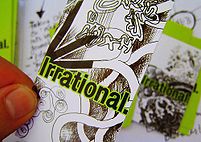Atheists, Adolf Hitler and the no true Scottsman fallacy
The no true Scotsman fallacy is a logical fallacy and more specifically a special case of circular logic. It involves dismissing any counterexamples.
The no true Scotsman Fallacy was coined by the English philosopher Anthony Flew in his book Thinking about Thinking - or do I sincerely want to be right?. At the time Flew wrote the book he was an atheist, but he later became a theist.
Atheists commonly commit the no true Scottsman fallacy (See: Atheism and the no true Scotsman fallacy).
In addition, atheists frequently falsely accuse Christians of using the no true Scottsman fallacy - especially when falsely claiming that the dictator Adolf Hitler was a leader who was a Christian.[2]
Contents
The Tekton Education and Apologetics Ministry on the no true Scottsman fallacy
The Tekton Education and Apologetics Ministry says about the no true Scottsman fallacy (NTS fallacy):
| “ | So how does this relate to apologetics? Too often, the self-impressed Skeptic will operate, or expect others to operate, under the misimpression that the NTS fallacy refers to ANY instance of eliminating an object (Y) from set(X). But as demonstrated above, the fallacy is becomes valid when set (X) and (Y) are nonintersecting! Since “Scotsman” has no relation to culinary tastes, the sets are capable of intersecting...
So when one says that Adolf Hitler is no true Christian, one is not committing the NTS fallacy. “Christian” is a label referring to religious and philosophical beliefs being held by the believer. Since Hitler’s actions, words, and expressed philosophies and professed beliefs are outside of, and in many cases contrary to, the belief set of Christianity, it is (barring a deathbed conversion for which there is no evidence whatsoever) valid to say that Hitler was not a Christian. Set X (Christianity) does NOT intersect set Y (Hitler’s beliefs [ Nazism ]), and thus object Y (Adolf Hitler) is not an object X (Christian). In conclusion, Skeptics need to either learn to understand the basics of the logic they claim to be able to hurl about, or find a different field to criticize from. Of course, the more likely outcome is that they will claim I’ve committed the NTS fallacy upon the fallacy itself! The No True No True Scotsman fallacy, perhaps? No, just Skeptics who need to either understand logic or abandon attempts to use it as a criticism![4] |
” |
Jesus Christ's gospel of love contrasted with Adolf Hitler's Nazism
Adolf Hitler wrote in Mein Kampf:
| “ | The stronger must dominate and not blend with the weaker, thus sacrificing his own greatness. Only the born weakling can view this as cruel, but he, after all, is only a weak and limited man; for if this law did not prevail, any conceivable higher development (Hoherentwicklung) of organic living beings would be unthinkable.[5] | ” |
Joseph Goebbels wrote in 1941 that Hitler "hates Christianity, because it has crippled all that is noble in humanity."[6]
Jesus Christ's gospel of love
In his article The Triumph of the Gospel of Love, Monk Themistocles (Adamopoulo) wrote:
| “ | It is generally agreed by scholars and saints that the teaching of "love" and charity represent one of the essential dimensions of the Gospel of Jesus and the Gospel of Paul. Accordingly, from the extant words and parables of Jesus many concern themselves with the message of love. For example on the Sunday of Meat Fare, from the Gospel of Matthew, we hear Jesus identifying Himself and in solidarity with the destitute, the suffering, the rejected and the oppressed, calling for and rewarding altruistic philanthropy:
"... I was hungry and you fed me, when I was thirsty you gave me drink, when I was a stranger you took me in, when naked you clothed me, when I was ill you came to my help, when in prison you visited me ... I tell you this anything you did for one of my brothers here, however humble, you did it for me." (Matt 25:35-36, 40)... Christians undertook a great deal of almsgiving to the poor not only to fellow believers but to pagans as well. So amazed was the anti-Christian pagan emperor Julian the Apostate (361-363 AD), with the sheer benevolence and excellence of Christian philanthropy that he was forced to admit in wonder their superiority over paganism in matters of charity: "These godless Galileans (ie. Christians) feed not only their own poor but ours: our poor lack our care" (Ep. Sozom. 5:16).[8] |
” |
Jesus Christ was a creationist while Adolf Hitler was an evolutionary racist
In addition, Jesus Christ was a creationist, while Adolf Hitler was an evolutionary racist.[9][10]
Adolf Hitler admired the work of the atheist Friedrich Nietzsche

The picture of Nietzsche above was taken in 1899. Nietzsche died in 1900.
The atheist Friedrich Nietzsche wrote: "But now God is dead. You superior men, this God was your greatest danger. Only since he is in the grave, have you risen again. Only now comes the great noontide; only now the superior man will be – Lord!"[12]
The Princeton University Press said about Adolf Hitler and the atheist Friedrich Nietzsche:
| “ | Thus the picture of Hitler gazing at Nietzsche's bust had more to do with a carefully orchestrated cult, one aspect of which was to connect National Socialism with the philosopher's legacy, at least by association. On October 1944, celebrating the hundredth anniversary of the birth of Nietzsche, Alfred Rosenberg, the leading Nazi party ideologist, delivered an official speech in Weimar, seeking to reinforce this impression: "In a truly historical sense, the National Socialist movement eclipses the rest of the world, much as Nietzsche, the individual, eclipsed the powers of his times."....
Nietzsche was clearly an elitist who believed in the right to rule of a "good and healthy aristocracy," one that would, if necessary, be ready to sacrifice untold numbers of human beings. He sometimes wrote as if nations primarily existed for the sake of producing a few "great men," who could not be expected to show consideration for "normal humanity." Not suprisingly, in the light of the cruel century that has just ended, one is bound to regard such statements with grave misgivings. From Mussolini and Hitler to Stalin, Mao, Pol Pot, and Saddam Hussein, the last eighty years have been riddled with so-called political geniuses imagining that they were "beyond good and evil" and free of any moral constraints. One has to ask if there is not something in Nietzsche's philosophy with its uninhibited cultivation of a heroic individualism and the will to power, which may have tended to favor the fascist ethos. Musssolini, for example, raised the Nietzschean formulation "live dangerously" (vivi pericolosamente) to the status of a fascist slogan. His reading of Nietzsche was one factor in converting him from Marxism to a philosophy of sacrifice and warlike deeds in defense of the fatherland. In this mutation, Mussolini was preceded by Gabriele d'Annunzio, whose passage from aestheticism to the political activism of a new, more virile and warlike age, was (as Mario Sznajder points out in his essay) greatly influenced by Nietzsche. Equally, there were other representatives of the First World War generation, like the radical German nationalist writer, Ernst Jünger, who would find in Nietzsche's writings a legitimization of the warrior ethos (as David Ohana makes clear).[13] |
” |
Benito Mussolini, Joseph Stalin, Mao Zedong and Pol Pot, who were mentioned above the Princeton University Press, were all atheists. The Muslim dictator Saddam Hussein greatly admired Joseph Stalin (Stalin was one of his heroes) and borrowed many of his ideas.[14][15]
New atheist Richard Dawkins' commentary on Adolf Hitler

See also: Richard Dawkins' commentary on Adolf Hitler
When asked in an interview, "If we do not acknowledge some sort of external [standard], what is to prevent us from saying that the Muslim [extremists] aren’t right?", Richard Dawkins replied, "What’s to prevent us from saying Hitler wasn’t right? I mean, that is a genuinely difficult question. But whatever [defines morality], it’s not the Bible. If it was, we’d be stoning people for breaking the Sabbath."[16]
Larry Taunton, the interviewer wrote, regarding Dawkins' Hitler comment:
| “ | I was stupefied. He had readily conceded that his own philosophical position did not offer a rational basis for moral judgments. His intellectual honesty was refreshing, if somewhat disturbing on this point.
Dawkins proceeded to cite the abolition of slavery and the civil rights movement as examples of Western moral advancements, but would not credit Christianity in the slightest. “Now you have to remember where I am from,” I objected. “Birmingham, Alabama—the home of the civil rights movement. Many there would argue that the Rev. Martin Luther King, Jr., was motivated by his Christian convictions. And what of William Wilberforce?” But Dawkins would have none of it. Christianity, in his view, had contributed nothing worthwhile to Western civilization, morally or otherwise. Moral advances—and, curiously, he did consider them advances—were matters for further scientific inquiry.[16] |
” |
See also
References
- ↑ Atheism by Matt Slick
- Putting the Atheist on the Defensive by Kenneth R. Samples, Christian Research Institute Journal, Fall 1991, and Winter 1992, page 7.
- Atheists don’t own reason by Tom Gilson
- Why the Burden of Proof is on the Atheist by Professor Ralph McInerny
- Theism, Atheism, and Rationality by Alvin Plantinga
- The Irrational atheist: Dissecting the Unholy Trinity of Dawkins, Harris, and Hitchens by Vox Day, Benbella Books, Dallas, TX, 2008 , ISBN-10: 1933771364; ISBN-13: 978-1933771366
- ↑ No true scotsman fallacy and skeptics by Thomas Shirk
- ↑ Darwinism and the Nazi race Holocaust by Jerry Bergman]
- ↑ No true scotsman fallacy and skeptics by Thomas Shirk
- ↑ http://www.icr.org/index.php?module=articles&action=view&ID=268
- ↑ Fred Taylor Translation; The Goebbels Diaries 1939–41; Hamish Hamilton Ltd; London; 1982; ISBN 0-241-10893-4; pp. 304 305
- ↑ The Triumph of the Gospel of Love by Monk Themistocles ((Adamopoulo)
- ↑ The Triumph of the Gospel of Love by Monk Themistocles ((Adamopoulo)
- ↑ Darwinism and the Nazi race Holocaust by Jerry Bergman]
- ↑ Jesus on the age of the earth by Carl Wieland
- ↑ Militant atheist arrogance and pride by Michael Caputo
- ↑ Militant atheist arrogance and pride by Michael Caputo
- ↑ Godfather of Fascism? On the Uses and Abuses of a Philosophy, Edited by Jacob Golomb & Robert S. Wistrich
- ↑ Tales of the Tyrant by Mark Bowden, The Atlantic, May 2002 Issue
- ↑ Stalin and Sadaam
- ↑ 16.0 16.1 16.2 http://byfaithonline.com/page/in-the-world/richard-dawkins-the-atheist-evangelist


